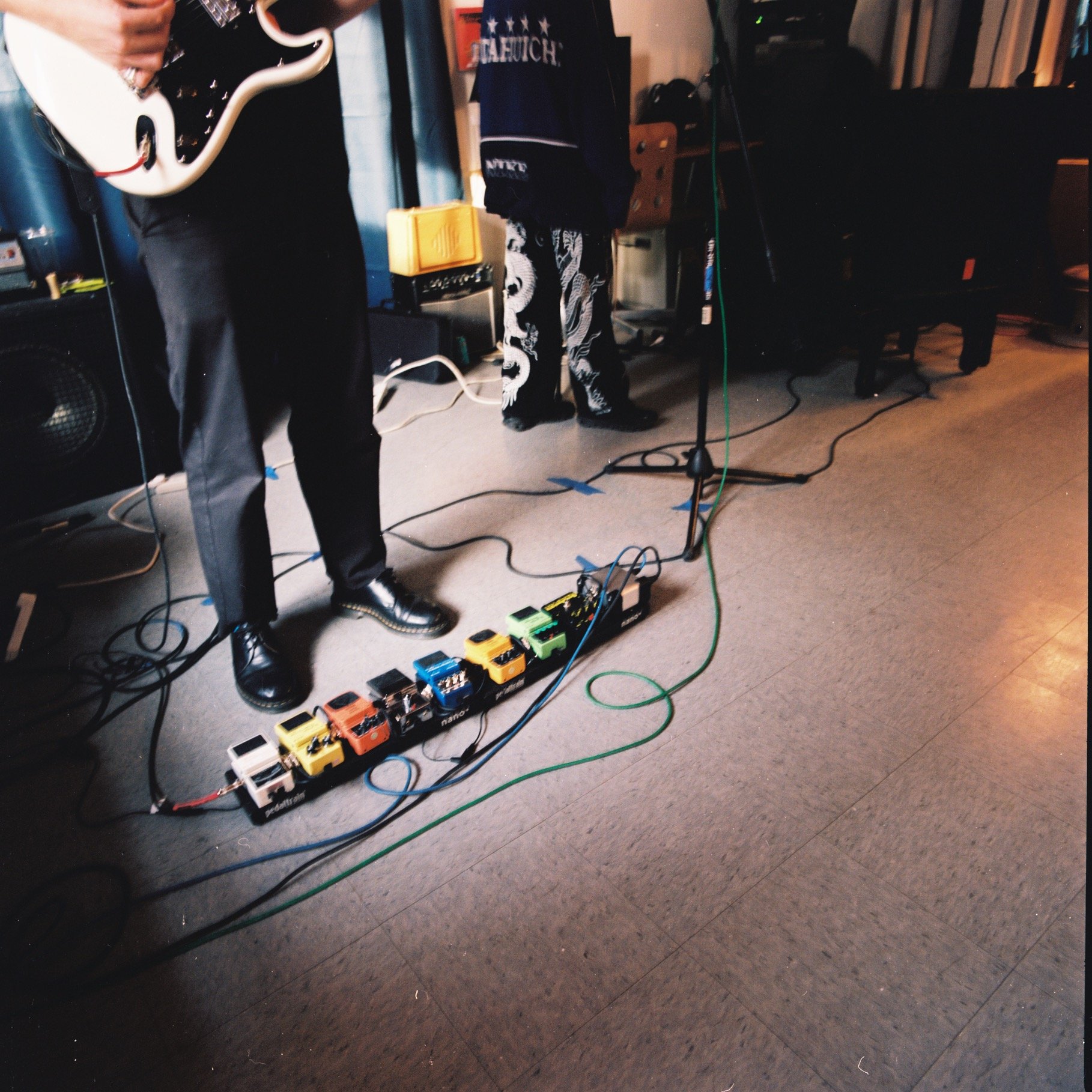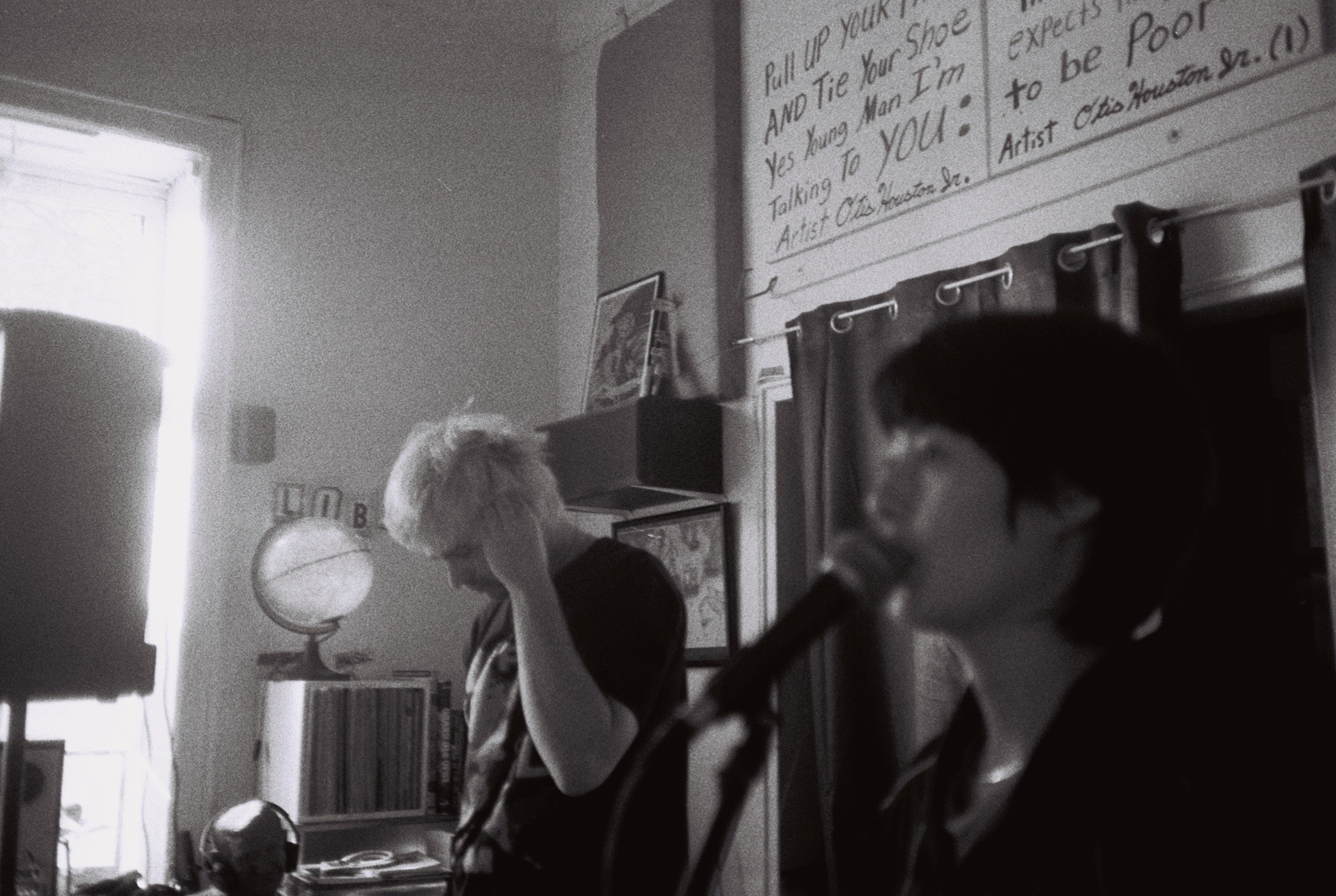Water From Your Eyes Is A Band You ShouLd Know
Water From Your Eyes is a challenging band.
Rachel Brown and Nate Amos—the Brooklyn duo that forms WFYE —make experimental/alt/dance/sad/dangerous pop music for the listener that likes not quite knowing why something is good, is working, and is making them move. Water From Your Eyes, originally formed in Chicago following a chance meeting (likely though indeterminately) when Brown attended a DIY show occurring in the living room of the house where Amos happened to be living, have been creating under the WFYE project banner since 2016, seeking continually to baffle and intrigue their audience, to much success.
Rachel’s effortless-yet-assured vocal delivery lives in slight conflict with the casual, sometimes even comedic lyrical content, and when laid over Amos’ complex, deeply layered instrumentals, the track comes together like the gears of a clock or a machine too intricate to work and yet does so perfectly. Their fearless exploration and refusal to abide by any standards of traditional genre classification have yielded an impressive and eclectic (the word is overused but, in this case, a genuinely appropriate descriptor) musical catalog.
What is really intriguing and perhaps a bit baffling is Water From Your Eyes’ ability to be so sprawling yet so cohesive. On a song like ‘Barley’, the first single from their forthcoming album, the multi-angular guitars and brimming percussion suits a tenser mood, full of forward confidence and unabashed purpose. It is a song that is very much at you, whereas on a track like ‘Adeleine’, there is more propulsion but less severity. The track is more narrative, at ease, and in many ways more for you. Both tracks—both moods—make sense within the WFYE catalog, and yet could exist entirely independently of each other. The ability of WFYE to make challenging, separated styles of music sound cohesive as a body of work (in addition to the fact that the music is at its root, very fun to listen to, and really, what more could you ask of a band?) is an extraordinary thing in itself.
WFYE’s music is danceable, cry-able, often more thoughtful than you think. Right before they headed on tour with Snail Mail and ahead of the release of their new album, Everyone’s Crushed, out on May 26th (from which, their second single, ‘True Life’ released today and linked below), we met them to talk about the process, Francis Bacon, and the validity of what they consider the great American rock band, the Red Hot Chili Peppers.
Who are you?
That’s a good question, I ask myself that all the time. I’m Rachel, this is Nate. We play in a band called Water From Your Eyes.
Where’d that name come from?
It’s a long-winded term for tears. Rachel came up with it when we were walking down Grand Street(?) in Chicago. Rachel is from there, and I lived there for a while. The origin of the project came from New Order. We love New Order, so we thought, ‘What if we make something like New Order?’ Sad dance music. We needed a name for sad dance music.
Was Tears taken?
Tears For Fears.
Oh, right. That’s not really the same, though.
Plus, Tears is too obvious. It has to have a little nuance.
It’s interesting that you describe it as sad dance music because I’ve read a lot of coverage about you, and you’re a uniquely difficult band to categorize. When someone asks you what kind of music you make, what do you tell them?
I think at a certain point, we just decided to go with ‘art punk’. I still say ‘experimental pop,’ but today I saw someone’s tweet that was like, ‘I hate when someone calls music experimental,’ and, you know, fair enough.
Well, isn’t all art supposed to be experimental in some way?
I feel like, for some people, it’s less about experimenting with the medium and more about experimenting with your own version of that. I don’t know. I make, like, indie rock music, and it is really not experimental. You know what I thought of that was cool? Instead of saying experimental, say risky. Dangerous.
Dangerous Pop?
Dangerous Pop! Danger-Pop-Rock.
I hear you and I think Stereolab.
People have mentioned Stereolab before, Broadcast, Sonic Youth. A very lit man somewhere in England told us that we sounded like Sonic Youth and New Order fighting underwater. That was one of the better ones. That guy was terrible. A real punisher.
Are there comparisons that people make that you don’t appreciate?
Not that I can think of. Somebody once said that I [Rachel] looked like one of the cartoons from the Gorillaz, and that hurt my feelings.
“I like when people are confused. I like when people see us live and tell me, ‘I don’t know what that was.’ Thank you. ”
I make it a point not to compare bands to cartoons when I interview them.
Yeah, that was rough. That was in the Audiotree comments section. We got roasted really hard on the live comments section. People were going in on us. I feel like we make music that most of Audiotree’s demographic would inherently hate.
Eclectic is an overused word, but you are sort of all over the place. What do you want? What do you set out to do with your music?
I like when people are confused. I like when people see us live and tell me, ‘I don’t know what that was.’ Thank you. That’s really nice to hear because it’s hard to do that. It started off going for New Order pastiche music, but we weren’t very successful in that. The last couple of albums started off with no particular intention in mind. I think that if there are intentions at the beginning of the process, our intention then becomes for those original intentions to dissolve.
What does your creative process look like?
I’m constantly making stuff, and maybe 20% of the time it feels worth pursuing, and if it is, I’ll make the instrumental or a loose melody with some bells or something. The tracks get made really rough, and then the idea for the vocals get like 50% cooked, and then we tackle it together. We generally write lyrics together, but Rachel is the dominant force in that process. Essentially, I make a wordless Karaoke version of a song, and then we knock out what vocals should go over. I also think that the instrumentals get so over-thought that it’s important for the vocals to be more reactionary.
What do you mean?
It’s like I build a sandbox for Rachel to play in and we try to get our most immediate reaction within the sandbox and not overthink that part of the process as much.
Do you do pretty well under limitation?
I think it’s easier. Once you’ve been given some ground rules, you know the edges are and you can fill in the space. I went to film school, and one of the best things my professor ever taught me was that limitations allow you to learn and grow.
What do you guys do outside of music?
I [Rachel] work on a lot of film and television sets just doing PA work, and I’m really into screenwriting, too. Nate is a really good producer.
What kind of producing?
All kinds of music, that’s sort of the only thing I do. I sit in my room and I make music. I [Rachel] have never known Nate to have a hobby.
No model airplanes or soccer games or anything?
Nate will get into a computer game every once in a while or go on deep Survivor binges. Oh, I [Nate} have got one. I’m really into painters and art history, but I don’t paint. I really want to be a painter but I’ve put too much time into music so I’m just going to stick to that.
You’re an aspirational painter?
Yeah, I’m an aspirational painter. I read a lot about Francis Bacon.
Does Francis Bacon influence the band?
If you listen to music, you’ll build this bank of music that informs the music you make, but visual art is the only conscious influence in my music-making process for this band. Particularly 19th and 20th-century artists. When making this last album, I thought a lot about Francis Bacon and tried to apply his thoughts and sentiments toward art to my own artistic process.
Is that not a challenge? Translating visual art into audio?
That’s what’s fun about trans-medium influences. Like, if you’re really into a certain artist, you’ll make music that sounds just like that artist, but if you’re influenced by a visual artist, then there’s this inherent subconscious translation that is unique to you. A whole bunch of people could make an album influenced by Francis Bacon, but all of that music will be different. There’s this process of interpretation that is specifically you.
Aaron Leitko: How are you guys doing? Good? Alright, I’ll just wander in circles, I guess. Let me know when you’re done.
I love that guy. He’s the best.
Aaron?
Yeah, he let us just ramble about the Red Hot Chili Peppers for like three hours when we first met. We really put him through the wringer.
The Red Hot Chili Peppers? Why?
Um, because they’re the greatest rock band? They are the great American rock band.
Is this a bit?
I love them. I really do love them. Their songs rip. I’m not saying all of their songs are great, but most of them are really good. I [Nate] found their worst song the other day. It’s a B-side from One Hot Minute called ‘Let’s Make Evil’, it’s unbearable. I think a lot of B-sides are pretty bad.
I think a lot of their A-sides are pretty bad.
Nah, man, their hits really hit. I mean, ‘Soul To Squeeze’? So good. One of the most beautiful songs. Which was originally a B-side until it ended up on the Coneheads soundtrack.
Would you cite them as an influence?
Not really. Maybe… spiritually? Not them as a group, but John Frusciante as a songwriter is definitely pretty deep in our subconscious. The thing is that their songs are not always good, but they’re also not serious. They aren’t a bunch of serious guys. They’re just all buddies. ‘Under The Bridge’ is a really serious song, but they walk that line really well where they put their heart into it, but it’s not too serious. Californication is as good a rock album as any other in existence.
This took a weird turn.
This usually happens.
Get some water in your eyes here.








